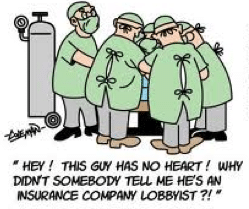 Los Angeles Times business columnist Mike Hiltzik offers a stark choice to state legislators in his Wednesday column. What'll it be, has asks: the millions of dollars that the insurance industry pours into your campaigns and treasure chests, or the millions of Californians battered by health premiums that kill the family budget or company benefits account? Plus the 8.2 million Californians with no health insurance at all?
Los Angeles Times business columnist Mike Hiltzik offers a stark choice to state legislators in his Wednesday column. What'll it be, has asks: the millions of dollars that the insurance industry pours into your campaigns and treasure chests, or the millions of Californians battered by health premiums that kill the family budget or company benefits account? Plus the 8.2 million Californians with no health insurance at all?
The choice Hiltzik lays out is between legislation (AB52 by Mike Feuer) that would finally give the state insurance commissioner the power to deny or modify unreasonable health insurance rate increases before they go into effect, and the exaggerated or outright false charges being slung by the industry. That opposition campaign is just a cover for the real issue: the power of industry campaign money and its lobbying force.
From 2007 through this year, for example, Anthem Blue Cross has made campaign contributions totaling nearly $5 million to candidates, parties and political action committees, according to state records. Blue Shield has contributed more than $2.3 million in the same period…..
Across the country, prior approval of healthcare rates is becoming more the norm, now effective in 34 states and the District of Columbia for at least some policies, according to the Kaiser Family Foundation. The procedure closes a gap left by federal healthcare reform that leaves rate regulation to the states and provides only loosely for premium review. Once again, AB 52 provides state legislators with a chance to declare whom they really represent — their voters or their campaign donors.
The insurance industry is going after legislators that it has contributed to, or who otherwise look susceptible. That helps explain why the legislation barely squeaked through a key committee vote last week after two Democrats voted against it.
The final vote in the Assembly has to come by Friday. Lobbyists will be swarming the halls outside the chamber, intending to ride the last-minute chaos of speed-voting to kill the rate regulation bill. Among the lies the lobbyists will be forcing down legislators' throats is that regulation will somehow raise, not lower, insurance premiums. Again, Hiltzik nails it:
Last year both Aetna and Anthem backed away from huge rate hikes after independent actuaries found glaring mathematical errors in their rate filings.
A study in 2009 by the New York state insurance department found that these sorts of errors, and worse, were rife under that state's then-deregulated system, which resembled California's toothless regime. New York found that insurers routinely under-reported such errors and refunded (retroactively) only about a third of the ill-gotten excess to policyholders. The study helped goad lawmakers there into reinstating prior approval after about 15 years without it.
As it happens, California's health insurance lobby has tried to use New York's experience as Exhibit A for the case against prior approval. The association contends that five of the 10 states with the highest individual healthcare premiums are subject to prior approval, with New York leading the list. There's a problem with this claim, however: New York's prior-approval rules went into effect only this year. In other words, New York's high individual premiums are the result, if anything, of the absence of prior approval.
When I asked a CAHP spokeswoman where the figures came from, she said they conducted "some unique research." That's one way of putting it.
Even if AB52 passes the Assembly, it still has to take the same tortured path through the state Senate. The outrageous rate-spiking by insurance companies last year and this ought to be the final shove for honest health insurance regulation in California, just like the state has for auto and homeowner insurance. But in today's legislature, nothing is sure. To take action with a message to your legislator, click here.
If you've read this far and want to know more, Read Consumer Watchdog’s new report on how rate regulation works to hold down premiums. And see what Sen. Dianne Feinstein says about the need for regulation.









